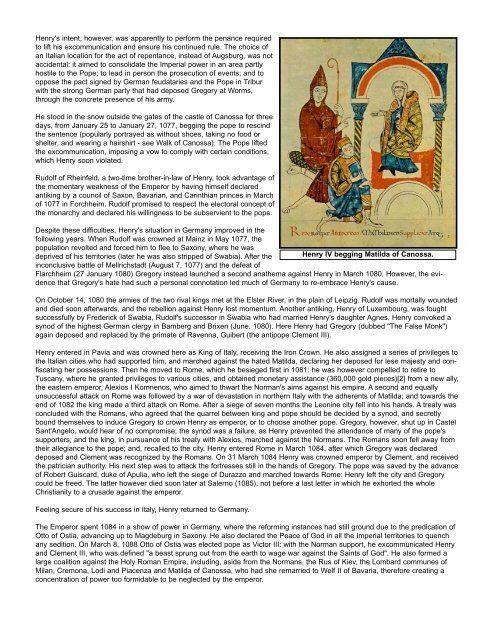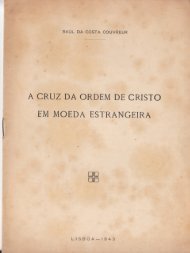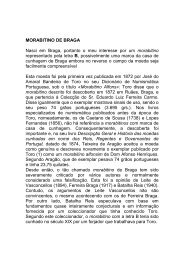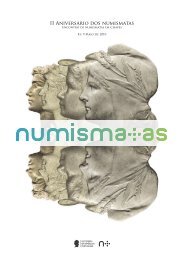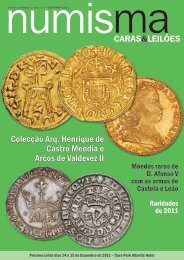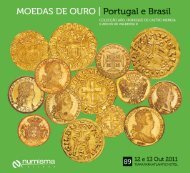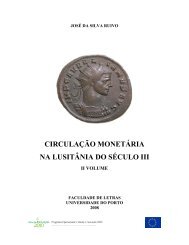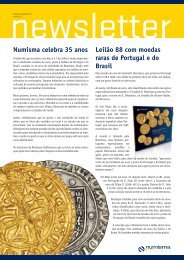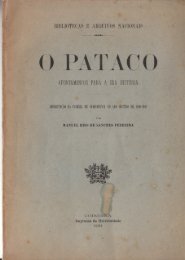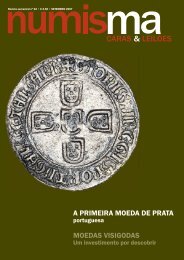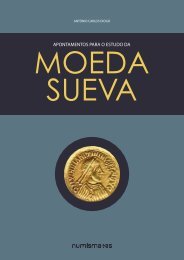You also want an ePaper? Increase the reach of your titles
YUMPU automatically turns print PDFs into web optimized ePapers that Google loves.
Henry's intent, however, was apparently to perform the penance required<br />
to lift his ex<strong>com</strong>munication and ensure his continued rule. The choice <strong>of</strong><br />
an Italian location for the act <strong>of</strong> repentance, instead <strong>of</strong> Augsburg, was not<br />
accidental: it aimed to consolidate the Imperial power in an area partly<br />
hostile to the Pope; to lead in person the prosecution <strong>of</strong> events; and to<br />
oppose the pact signed by German feudataries and the Pope in Tribur<br />
with the strong German party that had deposed Gregory at Worms,<br />
through the concrete presence <strong>of</strong> his army.<br />
He stood in the snow outside the gates <strong>of</strong> the castle <strong>of</strong> Canossa for three<br />
days, from January 25 to January 27, 1077, begging the pope to rescind<br />
the sentence (popularly portrayed as without shoes, taking no food or<br />
shelter, and wearing a hairshirt - see Walk <strong>of</strong> Canossa). The Pope lifted<br />
the ex<strong>com</strong>munication, imposing a vow to <strong>com</strong>ply with certain conditions,<br />
which Henry soon violated.<br />
Rudolf <strong>of</strong> Rheinfeld, a two-time brother-in-law <strong>of</strong> Henry, took advantage <strong>of</strong><br />
the momentary weakness <strong>of</strong> the Emperor by having himself declared<br />
antiking by a council <strong>of</strong> Saxon, <strong>Bavaria</strong>n, and Carinthian princes in March<br />
<strong>of</strong> 1077 in Forchheim. Rudolf promised to respect the electoral concept <strong>of</strong><br />
the monarchy and declared his willingness to be subservient to the pope.<br />
Despite these difficulties, Henry's situation in Germany improved in the<br />
following years. When Rudolf was crowned at Mainz in May 1077, the<br />
population revolted and forced him to flee to Saxony, where he was<br />
deprived <strong>of</strong> his territories (later he was also stripped <strong>of</strong> Swabia). After the Henry IV begging Matilda <strong>of</strong> Canossa.<br />
inconclusive battle <strong>of</strong> Mellrichstadt (August 7, 1077) and the defeat <strong>of</strong><br />
Flarchheim (27 January 1080) Gregory instead launched a second anathema against Henry in March 1080. However, the evidence<br />
that Gregory's hate had such a personal connotation led much <strong>of</strong> Germany to re-embrace Henry's cause.<br />
On October 14, 1080 the armies <strong>of</strong> the two rival kings met at the Elster River, in the plain <strong>of</strong> Leipzig. Rudolf was mortally wounded<br />
and died soon afterwards, and the rebellion against Henry lost momentum. Another antiking, Henry <strong>of</strong> Luxembourg, was fought<br />
successfully by Frederick <strong>of</strong> Swabia, Rudolf's successor in Swabia who had married Henry's daughter Agnes. Henry convoked a<br />
synod <strong>of</strong> the highest German clergy in Bamberg and Brixen (June, 1080). Here Henry had Gregory (dubbed "The False Monk")<br />
again deposed and replaced by the primate <strong>of</strong> Ravenna, Guibert (the antipope Clement III).<br />
Henry entered in Pavia and was crowned here as King <strong>of</strong> Italy, receiving the Iron Crown. He also assigned a series <strong>of</strong> privileges to<br />
the Italian cities who had supported him, and marched against the hated Matilda, declaring her deposed for lese majesty and confiscating<br />
her possessions. Then he moved to Rome, which he besieged first in 1081: he was however <strong>com</strong>pelled to retire to<br />
Tuscany, where he granted privileges to various cities, and obtained monetary assistance (360,000 gold pieces)[2] from a new ally,<br />
the eastern emperor, Alexios I Komnenos, who aimed to thwart the Norman's aims against his empire. A second and equally<br />
unsuccessful attack on Rome was followed by a war <strong>of</strong> devastation in northern Italy with the adherents <strong>of</strong> Matilda; and towards the<br />
end <strong>of</strong> 1082 the king made a third attack on Rome. After a siege <strong>of</strong> seven months the Leonine city fell into his hands. A treaty was<br />
concluded with the Romans, who agreed that the quarrel between king and pope should be decided by a synod, and secretly<br />
bound themselves to induce Gregory to crown Henry as emperor, or to choose another pope. Gregory, however, shut up in Castel<br />
Sant'Angelo, would hear <strong>of</strong> no <strong>com</strong>promise; the synod was a failure, as Henry prevented the attendance <strong>of</strong> many <strong>of</strong> the pope's<br />
supporters; and the king, in pursuance <strong>of</strong> his treaty with Alexios, marched against the Normans. The Romans soon fell away from<br />
their allegiance to the pope; and, recalled to the city, Henry entered Rome in March 1084, after which Gregory was declared<br />
deposed and Clement was recognized by the Romans. On 31 March 1084 Henry was crowned emperor by Clement, and received<br />
the patrician authority. His next step was to attack the fortresses still in the hands <strong>of</strong> Gregory. The pope was saved by the advance<br />
<strong>of</strong> Robert Guiscard, duke <strong>of</strong> Apulia, who left the siege <strong>of</strong> Durazzo and marched towards Rome: Henry left the city and Gregory<br />
could be freed. The latter however died soon later at Salerno (1085), not before a last letter in which he exhorted the whole<br />
Christianity to a crusade against the emperor.<br />
Feeling secure <strong>of</strong> his success in Italy, Henry returned to Germany.<br />
The Emperor spent 1084 in a show <strong>of</strong> power in Germany, where the reforming instances had still ground due to the predication <strong>of</strong><br />
Otto <strong>of</strong> Ostia, advancing up to Magdeburg in Saxony. He also declared the Peace <strong>of</strong> God in all the Imperial territories to quench<br />
any sedition. On March 8, 1088 Otto <strong>of</strong> Ostia was elected pope as Victor III: with the Norman support, he ex<strong>com</strong>municated Henry<br />
and Clement III, who was defined "a beast sprung out from the earth to wage war against the Saints <strong>of</strong> God". He also formed a<br />
large coalition against the Holy Roman Empire, including, aside from the Normans, the Rus <strong>of</strong> Kiev, the Lombard <strong>com</strong>munes <strong>of</strong><br />
Milan, Cremona, Lodi and Piacenza and Matilda <strong>of</strong> Canossa, who had she remarried to Welf II <strong>of</strong> <strong>Bavaria</strong>, therefore creating a<br />
concentration <strong>of</strong> power too formidable to be neglected by the emperor.


